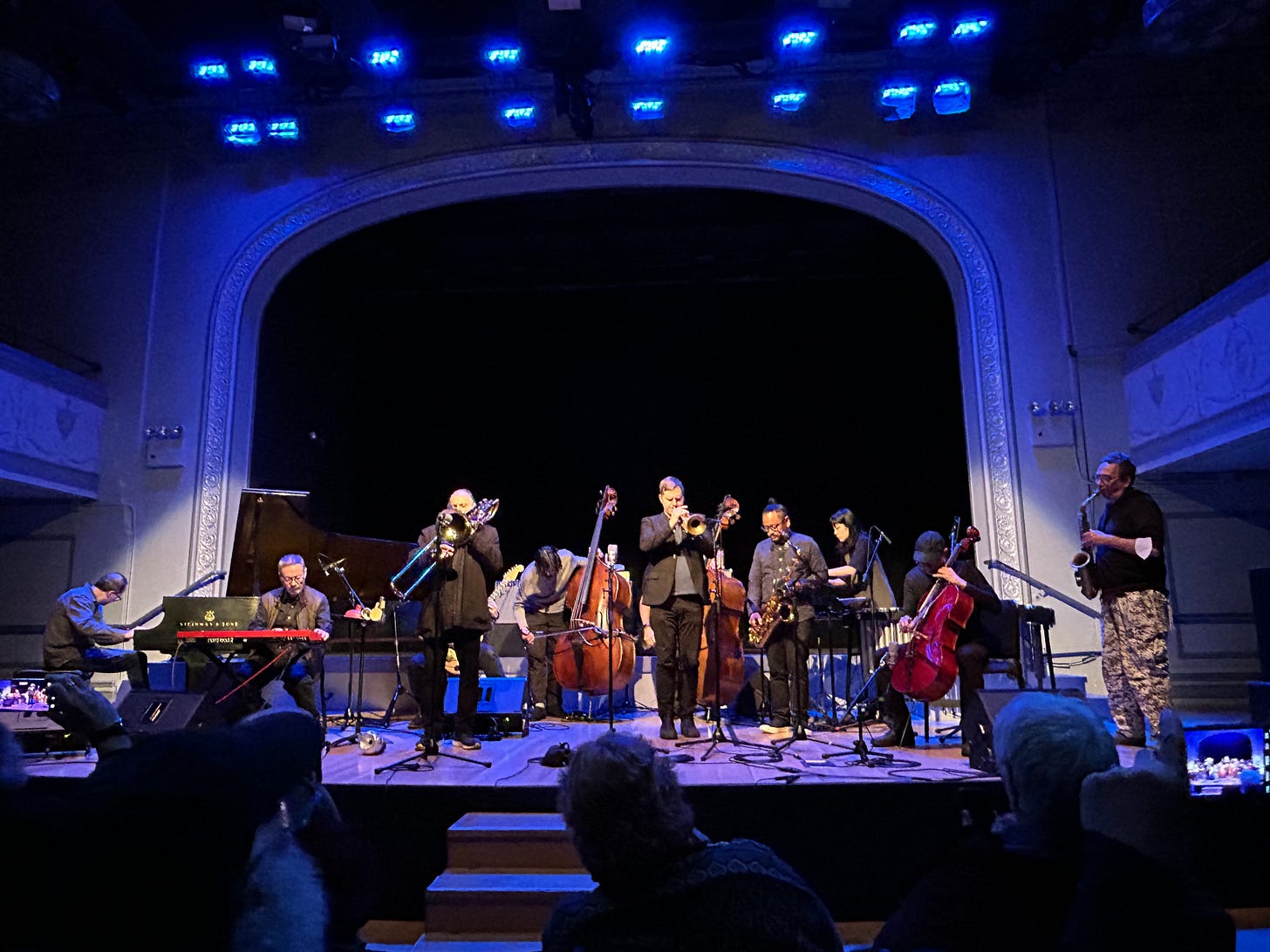Is Pop Music Too Perfect?
The clockworks of popular and classical music have completely reversed.
Popular music is rooted in improvisation. It developed through folk, then jazz, then rock ’n roll. Spontaneity was key. Correspondence between the social world of the performer and the music they played was essential. In fact, it was inevitable. If you were heartbroken, you played in a heartbroken way. If you were glad the spring was here, you’d play something joyful for the occasion. Whatever you played would be appropriate for the time and place, whether that was in your psyche or your city. In fact, musicians who were good at doing this were the best. They could adapt. They always made it new.
Classical music is rooted in form. The greatest composers manipulated familiar forms in new ways. What they formed, lasted. That lasting form was, and is, what is performed in concert halls. Often composers took hours to painstakingly perfect their scores. Just look at all the revisions Bruckner made to his symphonies. On the other hand, you had composers like Mozart, who could lay down a symphony or quartet in one fell swoop, consecrating the music’s design as immutable. Hundreds of years later, we are still trying to bring his scores, which were ostensibly already perfect in his head, to perfection in the hall. Whether you were a Bruckner or a Mozart, you were aiming for an ideal. If your musicians were any good, the music would approach, but never reach, that ideal.
Today, the most popular music is the most polished. The most forward-looking classical music incorporates improvised elements.
Olivia Rodrigo’s album GUTS is highly produced. I love it; I’ve listened to it probably a dozen times since it came out. But there are no imperfections. Even “Lacy,” whose imperfections should be especially apparent because it’s all acoustic guitar and voice, seems to arise out of nothing and out from my speakers. No trace of fuzzy recording stuff, and no wrong notes. Every pluck on her guitar is like an identical drop of dew on grass.
Often, I hear my roommate, a songwriter, listening to seconds-long snippets of a song over and over, polishing. It’s work. It’s like Beethoven, laboring over each measure.
Some of the best music was improvised. Unfortunately, most of it wasn’t ever recorded. And it still isn’t. Think of Bach, Bruckner, Labor, and Messiaen. All organists whose improvisatory abilities were reportedly miraculous. But what we hear today are their complete musical forms which they composed and have lasted.

What does reversal this mean?
First, it means that popular artists are less risky. You see it on TikTok, which is where a lot of popular songs now begin their lifecycle. TikTok shows you more and more of what you want. It's goal is to never show you something that you'll scroll past. It wants to keep you as hooked as possible for as long as possible. So do its musicians.
A few weeks ago, my roommate and I were talking about an artist’s music which he likes. But I asked him why, after three years of relatively stable success for an up-and-coming artist, why she hadn't gotten any more aggressive, radical, or pushed any boundaries. Why hadn’t she surprised anyone? He explained that reactions to her music are either, they really like it, or, “eh.” No one flat out hates it. If it ain’t broke, don’t fix it. Why risk alienating one audience for the potential fandom of another, potentially much larger, audience?
The point is that, by and large, popular musicians want to meet their listeners’ expectations. The phrase “all publicity is good publicity,” even if it's bad, seems to have gone out of fashion. Along with the sentiment.
Think of when Bob Dylan went electric. His fans who praised him as a folk god were pissed. But he crossed over to rock ’n roll. And got more of a rock ’n roll audience.
Step into the classical music scene in New York and the picture is very different. Today, it’s not so much “classical” music that’s in vogue here but “experimental” music. Squeaks, boops, screeches, and drones, is what that means. Compositions that are pre-made, rehearsed, and presented as one whole product, according to a score, are less at the forefront of serious musical progress. In my experience, it's been more about how you can make the composition a living thing, that can only happen in concert. You make the composition in front of the audience's very eyes.
In the age of mechanical reproduction, in which pop music thrives, this experimental tendency has garnered a small but passionate audience. Maybe it’s refreshing to experience something that can’t be replicated. With musicians honing their own original, whacky timbral techniques, the sounds often can’t even be replicated by other musicians. The only problem is that a lot of this music doesn’t sound very good to most people. It demands everything that most of us today are incapable of maintaining: attention, patience, listening, a clear head, and ultimately a steady heart (physically and emotionally). Sometimes I get anxious, heart beating, listening to long drones produced by Bob Bellerue and Katie Porter or David Watson.
You also don’t walk out of the venue humming what you just heard. It’s because you can’t remember how exactly it went. Schoenberg once wrote that people only like what they can remember. Same thing happened with listeners of his music. I can’t sing back the Op. 11 Three Piano Pieces to you. I can’t make you dig Schoenberg without bringing you to a concert or playing you a recording.

Clearly, experimental music works very different faculties in the human body and brain than popular music does. Let’s generalize and say for the sake of argument that when we listen to popular music we either dance (Bad Bunny) or are stunned into an unthinking lethargy (Hozier). And let’s say when we listen to classical music or experimental music, we get restless (I have a friend who can’t listen to symphonies because they’re too long and he gets anxious) or into a trance-like state (drone music does this).
Let’s pair Olivia up with Justin Timberlake for a second. I love his new album, Everything I Thought I was. I didn’t at first. But then I listened to his Tiny Desk. The fact that he was as good live as on record got me hooked. When we listened to, say, “F**kin’ Up The Disco,” we are faced with utter perfection. I mean it. No mistakes. How can you even call this music? (You can.) But what is music without mistakes? A computer program? It’s really something more akin to an orchestral score of Beethoven, which is perfect on paper, and always imperfect in performance. Likewise, “F**kin’ Up The Disco” (or Ariana Grande’s “bye” or Troye Sivan’s “One Of Your Girls”) is perfect in headphones or speakers but imperfect when it’s live. Often disappointingly so.
Compare this to recordings of Harmonica Frank. Listen to “Rockin’ Chair Daddy” (1954). He “never went to college and [he] never went to school, but when it comes to rockin’ [he’s] a rockin’ fool.” That’s what he does. He rocks. He plays music. The song is literally about him playing music. And he’s creating the composition in front of our very eyes. How does he do this? His idiosyncrasies, his voicing of multiple characters (female voice says, “rock it boy!”), not to mention the recording quality itself. All of this does something very important, which is something that has all but disappeared from popular music today: It lends a humanity to the music, reminding us that there is in fact a man behind what we're listening to.
I once had a friend who commented on how so many pop musicians sing so quietly. Because recording technology is so advanced, we can now pick up whispery singing in a way that we couldn't 50 years ago. (If Harmonica Frank whispered, the machine wouldn’t be able to pick it up.) Listen to Faye Webster’s “But Not Kiss,” another song I’ve been obsessed with lately. When she sings, “I want to sleep in your arms, but not kiss,” it’s extremely quiet. When I play this song in the shower, I don’t even hear the music until after the ensemble comes in immediately after she sings “but not kiss.” There’s an intimacy about this. It’s the way someone speaks to you in bed.
But the thing is, no one talks like that in real life. If you tried at a bar or restaurant, you wouldn't be able to hear anything. When you’re telling a story, you don’t speak like this. And that’s what most music with words is about anyway—story. Have you ever whispered a story to someone in bed? Probably not. You probably only whisper when you’re speaking sweet nothings.
So, okay, too much perfection takes the humanity out of a recording or piece of music. Or maybe better say it makes the experience less realistic. Most great classical music exhibits this same phenomenon.
Think about Beethoven’s 7th symphony. Recently, I was listening to Otto Klemperer’s recording of it. I was struck by how slow his tempos are. And how deliberately he brings out every. single. note., even in the fast movements. For hundreds of years, musicians, conductors, and scholars have debated Beethoven's tempi. There must be one correct way, it seems. But there isn’t. And, in a way, every performance of it, along with any other “fixed” composition, contains some sort of unconscious, unintentional improvisation. But the creator—Beethoven, in this case—is uninvolved. The humanity of the composer was lost forever when he put the notes down on the page. And the humanity of the players is always necessarily negated. They are messengers. They bring the music to us from Beethoven. But they aren’t human. The orchestra is a fundamentally autonomy-destroying ensemble.
So is the recording studio.

Record producers and engineers are the classical composers of today. They're the ones who go to painstaking detail with beats and entrances, mixing it all together and creating the composition, which becomes the track. It's not orchestrated on stave paper; the composition is the song itself. And it comes to us in perfect form, each time when we click “play” on Spotify.
Why has this happened? One reason is that most pop musicians who are popular today are poor musicians. They just can't play. So we can't expect any deviations or improvisations or surprises from them because they can't give them to us. If they didn’t stick with the simplistic techniques, their sound would be shit.
On the other side, classical musicians are better than ever. There are more virtuoso pianists than ever before. The quality of musicianship coming out of conservatories today would make Franz Liszt, Rachmaninoff, and Paganini stunned. They would probably be passed over for gigs because they played too many wrong notes. There are just too many good classical musicians.
So how do you differentiate yourself?
Play poorly. That’s what—so it seems to rookie listeners!—a lot of experimental musicians in New York do.
Many musicians in the experimental scene right now graduated from top conservatories. They took their skill and came out the other side, often paring down their styles to the simplest sounds possible. So it appears that they’re just not very good. But the number of musicians who didn't go to music school, or were completely self-taught, is probably the same if not higher. John Zorn never went to music school. But in 50 years when people talk about avant-garde music in New York—or the “progress” of music in general—they will no doubt be talking about Zorn. You go to one of his concerts and you never know what you’re going to get. He improvises a lot.
If you’ve gotten this far in the article, congratulations. Since this is my Substack and not a paid writing assignment, I reserve the right to withhold from you a nice witty conclusion tied up with a bow. But I think you get the point. So if you don’t like how I wrapped this up, check out some of my more recent pieces in real publications. They have better endings. I recently reviewed the American premiere of Nadia Boulanger’s only opera and Chou Weng-Chung’s centennial celebration concert in EarRelevant, along with a feature on the “Striped Light” experimental music series in Long Island City for the Brooklyn Rail.
And make sure to tune in to The Best Is Noise every Monday at 2PM on Radio Free Brooklyn, or replay episodes in the archive whenever you want. I had an amazing conversation with sinonó a few weeks ago and interviewed my mom in March. She has better taste than I thought! (love u mom)
More soon.



